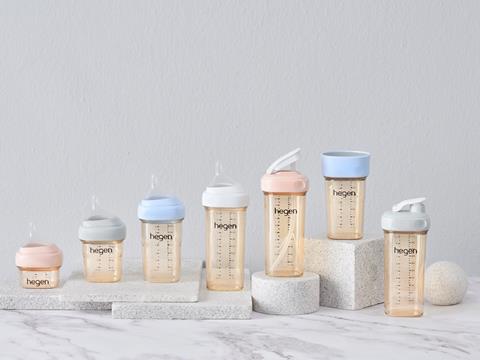
Solvay has entered into a strategic partnership with Hegen to produce baby feeding bottles made from recycled, non-fossil feedstock content.
The feedstock of the PPSU grade is third-party mass balance certified, and is being described by the companies as an amorphous, naturally amber-transparent polymer, free of artificial pigments, phthalates and bisphenols, such as BPA.
“Brand owners and manufacturers in the childcare market are increasingly seeking to improve the sustainability of their products without compromising safety, efficiency or convenience,” says Guillaume Meunier, Head of Marketing, Life Solutions at Solvay Materials.
“Hegen’s baby feeding and drinking bottles are widely acknowledged for their high quality and use the highest-purity materials to ensure a healthy and comfortable feeding experience for both mother and child. We are very pleased to announce that the company has decided to adopt our mass-balance certified PPSU for molding their iconic bottles.”
“We are excited about this strategic material partnership with Solvay, which will help us further reduce the environmental impact of our baby feeding bottles in line with our ambitious sustainability roadmap,” adds Yvon Bock, founder and CEO of Hegen.
“The circular Duradex polymer exhibits the same high-performance properties as the previous material used in molding our premium Hegen PCTO bottles, including excellent processability and uncompromising durability, which makes it a very efficient drop-in alternative to all-fossil PPSU solutions.”
Solvay says that Duradex PPSU MB is linked to 54% allocated circular, non-fossil feedstock, which is third-party mass-balance (MB) verified under the International Sustainability & Carbon Certification PLUS (ISCC PLUS) mass balance accounting regime.
In addition, Solvay’s Duradex PPSU MB polymer is reportedly high scratch-resistant and stain-resistant, does not absorb odors and delivers an inherently non-stick surface. It also combines “exceptional hydrolytic stability and shatter-proof toughness with high heat resistance”. Solyav claims that these properties also qualify the bottles for more than 1,000 steam or hot water sterilization as well as dishwasher cycles without the risk of any damage.
If you liked this article, you might also enjoy:
The Lidl approach to packaging sustainability
How did Brazil achieve its 100% aluminium can recycling rate – and can it be replicated in the EU?
Experts have their say on the EU’s Packaging and Packaging Waste Directive revisions
A deep dive into the most important packaging sustainability trends and solutions
















No comments yet